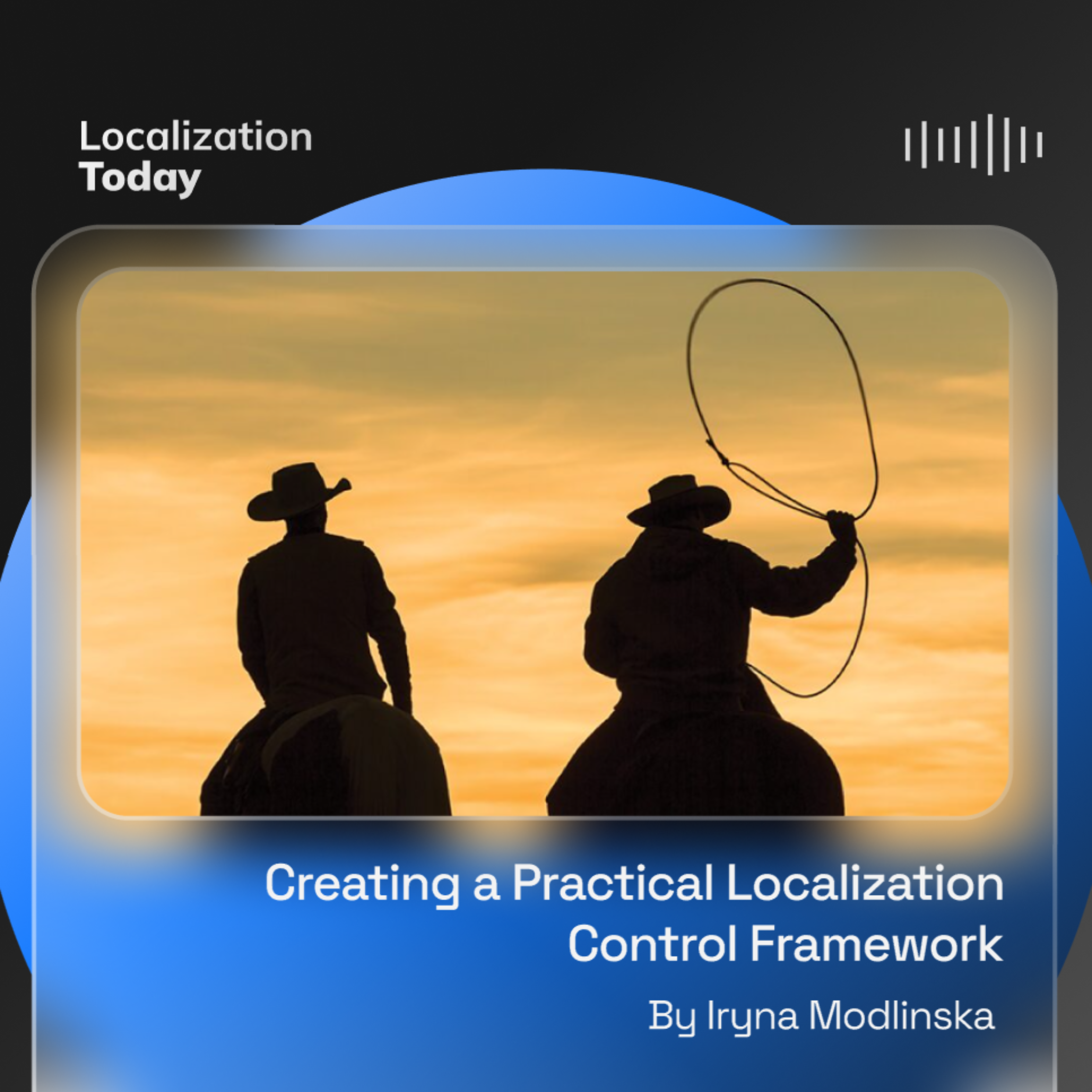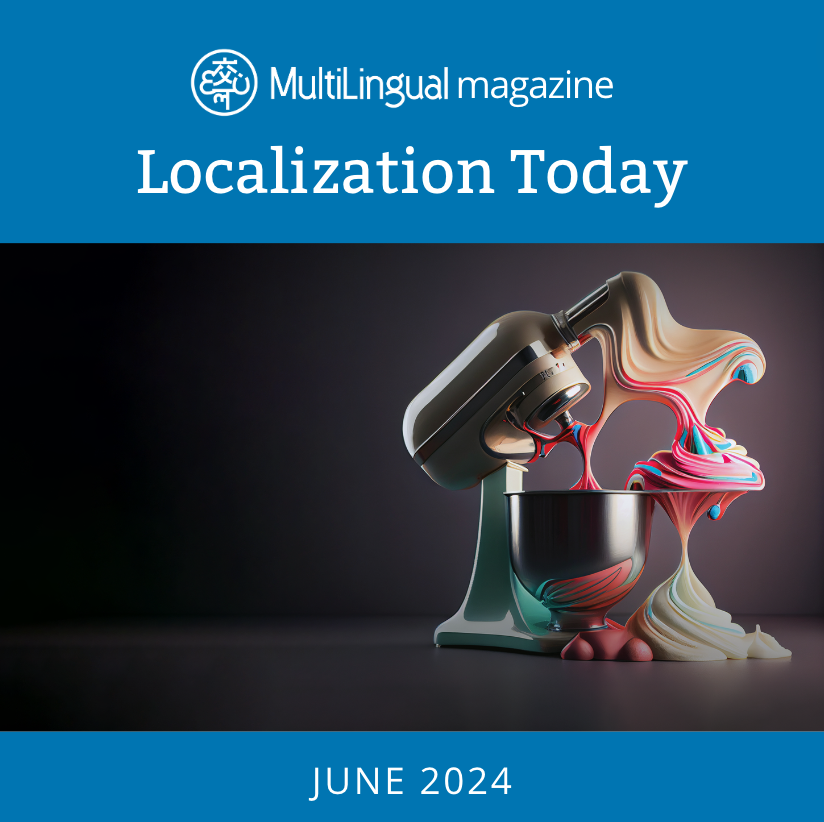Episode Transcript
[00:00:03] Speaker A: Hi, my name is Javier Diaz. I am the head of community at BureWorks, the AI power TMS.
[00:00:19] Speaker B: Javi. Finally, finally, the main question is, whose Javi are you?
[00:00:24] Speaker A: Oh, right now and euroworks Heavy your burrow works.
[00:00:28] Speaker B: Because you always say too hobby too.
[00:00:31] Speaker A: Okay, there's only one hobby. Thank God, thank God, thank God. And I've been with BureWorks since September 2033. It's my second time in the house. It's my family. I'm loving it here. And we are literally killing it right now at this moment of the. Of our. Of the evolution of AI and LSPs moving forward to get AI solutions, AI power solutions to offer to the clients. It's a great moment.
[00:00:58] Speaker B: Excellent. Thank you so much.
[00:00:59] Speaker A: Happy to be here with you guys.
[00:01:00] Speaker B: Yeah, thank you. Thank you for the introduction. For those that are listening, we are in the context of Gala 2025 Montreal. And of course, Javi arrived late. What happened?
[00:01:13] Speaker A: Okay, first 2025 in three weeks, mate. It's my 10th year in the industry.
[00:01:19] Speaker B: Congratulations.
[00:01:20] Speaker A: Over three. Three. Three companies only say knock on wood. Okay, I'm late. I came to the conference on the second day, which is today, Tuesday, because I had problem with one of my documents and I couldn't board my plane. Sorry about that.
[00:01:36] Speaker B: People. People were waiting for you. People were waiting for you.
[00:01:40] Speaker A: I was waiting for people.
[00:01:41] Speaker B: And we're happy to have you here. You're talking about the evolution of technology in the industry. You have some bold statements about Borrow Works, and I understand where you're coming from. Can you tell us a little bit more why you've discovered that that's the case since you got to Borrow Works?
[00:01:57] Speaker A: So over the last. Let's talk about the last five years, since the pandemic to here, I had the opportunity to work in two companies. One on the LSP side and the tech, full tech solution tech side of the industry. Right.
In late 21, 22, we had the boom of artificial intelligence. During the next two years, 22, 23 and 24, there was a lot of talk and people were hearing things and this, this and that. And in my impression, people were not really adapting AI solutions. While now in the last six months, it all has changed. People come to us, they talk about this, they ask that, they talk, they come to us saying, like, we have a client that is requiring us to do this and that. Can we implement some certain AI workflow. Things are changing, conversation is changing right now. It's a good moment for Explorer. It's a good moment to do Things.
[00:02:51] Speaker B: And as you are exploring, and we've had several conversations here in localization today, that exploration has a methodology behind it. And we've talked to Gabriel about the methodologies at Burrow Works. What are some of the things that you've seen recently that are helping the company move in that direction and help your clients move in that direction?
[00:03:11] Speaker A: So basically, on top of everything, full automation, taking your. If it's on the LSP side, being fully digitalized and automated, that's the difference. That's what people are coming to us right now. That would be the main thing. On the enterprise side, it's a bit more complicated. People look for other types of solutions or to complement things, but they. It's a moment of change. That's the tonic. That's the key thing that is happening right now.
[00:03:35] Speaker B: Yeah. And another element to these conversations has been community. And I know you're a big proponent of community. Your title says so what are some of the things that you're seeing in the community that inform you about how easy is it going to be to adapt to technologies and how the community is going to help itself go through this stage?
[00:03:55] Speaker A: Very good question. Like I was seeing, unfortunately, a lot of fear lately. A lot of fear for change, a lot of fear for exploration, a lot of uncertainty. Right. That was driving the community up to now, early 2025, as I said, and as I want to stress again now, people have changed that fear towards. Okay, it's here. We are exploring, we're adopting, we're early adopters now. It really has happened. That's what the community is talking about. In my. In my experience or my little experience right from being in this conference today.
[00:04:29] Speaker B: For example, and of course, you know, being an influencer in the industry.
[00:04:33] Speaker A: Oh, no, I'm not an influencer. Don't do anything. I do.
[00:04:36] Speaker B: Don't do anything. Don't do anything. Don't copy have it as he's unique.
But Burrow Works is present in many different events. What are you hearing from your clients? What are they telling you about burroworks and the work that you're doing?
[00:04:52] Speaker A: Precisely how light it is to implement, how easy it is to work with the level of automation you can get the possibility of implementing real AI solutions. That's what people are coming to us and that's what makes us different than any other provider out there. Yeah, that's our main advantage.
[00:05:13] Speaker B: And as you're working with automation and technology, what's the role that humans are playing within Boorroworks?
[00:05:21] Speaker A: Humans are always there. Human in the loop, human in the center. That's it. That's it. But you need to help a human go to the next level, right? I'm a sales guy. I'm doing sales, let's say, in a modern way. Imagine if in 2025 I was doing sales like I was doing in 2010.
Would I be picking up the phone and calling people? Imagine if I pick up the phone and call people every day. I could call 20, 30 people. But if I use AI now, I can reach 100. Doing it easily and with a much better approach.
So localization people, same stuff.
[00:05:55] Speaker B: Really good. And of course, I was fortunate enough to see your presentation. Abamos Juntos. Thank you so much for sharing. It does highlight the need for professionals to start looking at their personal brands and really how they represent themselves in light of what effect that has on the companies that you are representing. In turn, could you tell us a little bit about some of the things that you talked about and the importance that this has?
[00:06:20] Speaker A: So here's. Here's my. My point, Eddie. Like, I started in the industry, As I said, 10 years ago now, and I was like, my first meetings were like, I'm talking to these people that I don't have a clue of what they're talking about. How am I going to. How am I possibly going to be selling to those people?
So in my advant, in my advantage, I used my skills and I said, okay, how can I make a difference with the weapons, with the tools that I have? The weapons that's probably more Spanish as Haro masque tango than anything else, but with the tools that I have in my advance. So I started, like, thinking of ways that I could connect people without getting to be technical salesperson. If you're listening to this, you can also do it. And I started focusing a lot on my brand, on how I can reach more to more people, and especially on top of all, how can I connect more professionals to my business, to my activity, and to the community itself? I spend a lot of time helping people get jobs, connecting people to get a job here, there, and that's incredible. I feel good about that because it makes a difference. It makes me feel good. It makes me feel that I'm helping the community. It helps me sell. It helps me sell without being a technical person. And I'm doing okay. I think I haven't lost my job, so I'm doing good.
[00:07:36] Speaker B: Of course. Of course, in a lot of these, there is the praxis of it and actually getting to do it. And, you know, we See that you share a lot of the actual trips that you do, the traveling that you do, the personal experiences that you have. How much thought and editing and QA are you adding to all of this content that you are putting out there?
[00:07:56] Speaker A: Zero. Like it's me. I'm a lawyer. I don't come from a marketing background. I mean, I'm kind of from a business background. But I've learned to communicate and to find a voice and to find a tone and to find things that really represent me and that show me as a real human here, not as other fakes that could use. You could see around and. Yeah, and that shows authenticity, I think. And if I can do it, you can do it too. Anyone can do this. So start thinking of the stories you could tell. You don't have to be a world traveler like I am. You can be anywhere. You could be whoever you want. There's a story you need to think of that you can tell, make it engaging.
You don't have to edit a lot. Be yourself, be nice, show values. Present who you are. And that's going to connect you to people and that's eventually going to bring you revenue and that's eventually going to give. Bring wellness to you. Wealth, sorry, wellness. Wealth to you, to those around you. Right. I believe in those things. I live by those things, by those principles. And I have to say that they're working. I'm still not a millionaire, though. But maybe one day.
[00:09:04] Speaker B: And that will come from the definition, the definition of wealth. And anyone has. But for sales, it seems to be very easy to understand how this connects for those that are not in sales. Right. Customer success, translators, interpreters. We can infer a little bit how this could be beneficial to them, definitely to the company. Could you give us a few words on why those that are not in sales and marketing should and could benefit from doing.
[00:09:28] Speaker A: Everybody is a salesperson. You watching this? You are a salesperson. You have to sell up to upper management. You have to sell to those to work with you. You have to lead. More than selling is to lead, to lead by example, to lead by thought. And like I still haven't figured out if it's something that you're born with or you adopt. I think it's something you can adopt and you can always learn because. Because you can always learn. So, like I was interviewing my best friend Anna Schlegel not long ago about her life and she's for me, along with a couple of people that are here, the top leader in our industry. And she said something that is like incredible to me. And it resonated like good leaders always have to keep studying and learning. So if you're a translator, keep studying, keep learning, keep doing something that you can transmit to others. You'll be leading, you'll be selling eventually and you'll be improving your wealth and your customers wealth. So this sounds a bit like fairy tale in the world of lollipop and caramel, but it's working. If it's working for me. And I don't want you to copy what I'm doing. You have to find your tone and your voice. But it works.
[00:10:38] Speaker B: And thank you. You've already given us great suggestions for the things people should be doing. I want to switch gears a little bit. So you were doing nomadic work last year. Many now you are settled in Mexico. So how is that going? What have you found difficult or what are some of the benefits you've seen from doing that?
[00:11:03] Speaker A: So I've always, personally, since I'm talking about myself, I've always found beneficial for me and the way I connect and I do business and I bring wealth. If I could say that traveling because it allows me to meet people, it allows me to meet cultures, it allows me to understand how somebody in Japan is, how different they are from us Latinos, how different they are from us, from whatever. Right. That has helped me a lot understand traveling and that nomadic lifestyle that you refer to. But love comes to town and I found somebody and I'm settled down for the last six months and I'm happy also doing a lot of more like, so to say, like regular computer work and travel a bit less. But I have a good combination. I think I've achieved a good combination of that. It's like what is like the second conference of the year, right, for us?
[00:11:57] Speaker B: Yeah.
[00:11:57] Speaker A: And it's only early April. Plus another event we did in Seattle with our father, Renato Veninato as well, which we did a super cool small event there, I think to the point. I think the combination of all these things is making me achieve what I want and I want to continue doing this traveling, working at home, connecting people, recording podcasts. It's important to put your voice out there as well. Follow our podcast Merging Minds by Bureauborgs. Incredible. The best leaders in the industry, humanized. Like I'm bringing the human element of the leader to the industry.
[00:12:32] Speaker B: And we'll find a way to put in the comments of this recording. When we're promoting on social media, the team will be able to put the links of merging minds so that those that are listening can get to that recording. Of course, this new situation in which you are working remotely from a specific area of the world is also forcing you in a way to create local impact. So you talked a little bit about a lock launch that was to happen. It of course exemplifies again the challenges of building community. Could you tell us a little bit about that experience?
[00:13:11] Speaker A: So to build community, I think that's one principle. Give before you take, period. Like, that's what I was mentioning, that telling a story that is engaging and that resonates with somebody or with people that are watching, so to say, helps. Right? Like for example, as you were mentioning, like, our friend, the great Jan Henrich founded Loglanch six years ago and it's been a total success worldwide. Right. The other day we did the first one in Guadalajara. Nobody showed up. But we insist we go out there, we do these things, we show up, we continue insisting, and eventually it works. It works. How this is helping me is helping me. Like, it's a constant thing. It's a constant. Like my. I think I have set my mind in a growth mode, which helps me to, as I say, it's, as I've said, like to build business, to make connections, etc. Right. And definitely that balance of both things is incredible.
[00:14:16] Speaker B: And anyone else that works with Burrow.
[00:14:18] Speaker A: Works, first of all, don't be scared if I did it. You can do it too. Anyone can do this. Just be true to yourself, find your voice, go after it and never give up. Because it sounds very on paper, but it is. Second of all, this is a very millennial principle. Be flexible. You got to be flexible. You're not going to like the same things tomorrow that you like today.
With keeping the line, I mean, keeping the line. We need to be flexible. And third of all, enjoy the ride. It's the importance of the journey that matters, not the goal. Peace and love.
[00:14:55] Speaker B: This was our conversation with your hobby from Burrow Works. My name is Eddie Arrieta, CEO here at Multilingual Media. Until next time, goodbye.


